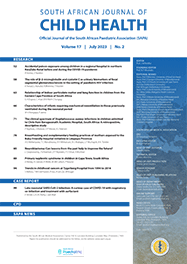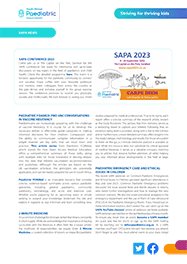Articles

Early Surfactant therapy and nasal continuous positive airways pressure for mild respiratory distress syndrome - a pilot study
Abstract
To determine if the administration of Curosurf® 100 mg/kg within 24 hours after birth, to infants with respiratory distress syndrome (RDS) receiving nasal continuous positive airways pressure (NCPAP) and inspired oxygen (FiO2) 0.3–0.4, decreased the need for mechanical ventilation (MV) during the first week of life when compared to infants in whom the required FiO2 was allowed to rise above 0.4 before Curosurf® was administered.
Design and subjects
Twenty-seven preterm infants were randomised into either a low- or a high-threshold group. The low-threshold group received Curosurf® immediately and the high-threshold group received Curosurf® if their FiO2 rose above 0.4. Infants who received surfactant were returned to NCPAP if respiratory effort was adequate.
Setting
The Neonatal Intensive Care Unit, Groote Schuur Hospital, Cape Town.
Results
The mean gestational age for the entire cohort was 31 2 weeks. There were no significant differences between the groups with respect to the need for MV in the first week of life. However, the duration of any form of assisted ventilation (NCPAP and MV) was significantly less in the low-threshold group (p= 0.042). The low-threshold group had a lower mean PaCO2 at 24 hours (p = 0.015).
Conclusions
The administration of 100 mg/kg Curosurf® to preterm infants with RDS requiring NCAP at a threshold FiO2 0.3–0.4, improved alveolar ventilation and reduced the duration of any form of assisted ventilation, compared to waiting until the FiO2 was above 0.4. There was no significant reduction in the need for MV.
Authors' affiliations
Alan Horn,
C Pieper,
I Els,
S Holgate,
Full Text
Cite this article
Article History
Date published: 2009-08-26
Article Views
Full text views: 1822

.jpg)



Comments on this article
*Read our policy for posting comments here